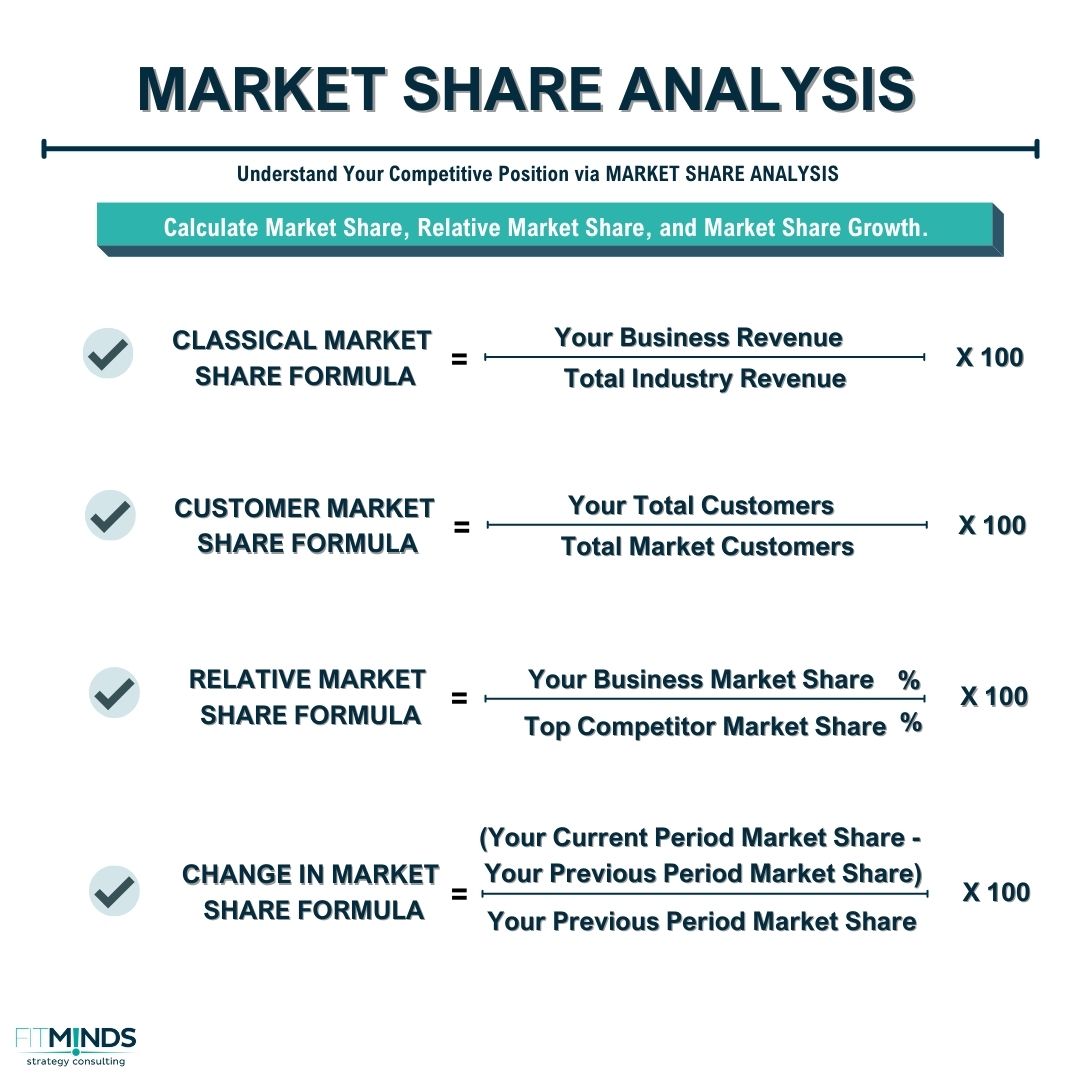Market share analysis is a key indicator of market potential and opportunity. It is the process of evaluating an organization’s competitive position in the industry.
Main Benefits of Market Share Analysis
By evaluating market share and market size, companies can understand their competitive position in the market and identify opportunities for growth.
Market Share Analysis help:
- to pinpoint areas for improvement,
- to monitor industry trends and develop targeted strategies to increase market share,
- to evaluate the effectiveness of marketing efforts and make adjustments as needed,
- to understand customer needs and decide how to allocate resources,
- to make data-driven decisions to drive growth and profitability.
Explanation of Market Share Analysis:
To conduct a comprehensive market share analysis, it is necessary to consider various factors, including classical market share, customer market share, relative market share, and market share growth.
To calculate market share, a company’s total sales or revenue within a particular market is divided by the total sales or revenue of that market, and the result is then multiplied by 100. While classical market share formula is based on the industry’s total sales, customer market share formula is customer-centric.
CLASSICAL MARKET SHARE FORMULA = (Your Business Revenue / Total Industry Revenue) X 100
CUSTOMER MARKET SHARE FORMULA = (Your Total Customers / Total Market Customers) X 100
Relative market share compares your performance to industry leaders. It is used to measure a company’s market share relative to its competitors. It enables you to learn how much you control the market or industry.
RELATIVE MARKET SHARE FORMULA= (Your Business Market Share % / Top Competitor Market Share %) X 100
Change in market share enables businesses to track their performance over a period of time.
CHANGE IN MARKET SHARE FORMULA = (Your Current Period Market Share – Your Previous Period Market Share) / Your Previous Period Market Share x 100

You can conduct a comprehensive market share analysis by following these steps:
- Calculate your company’s market share, relative market share and change in market share.
- Explore the market size and predict the potential for growth in market share.
TAM (Total Addressable Market) and SAM (Serviceable Available Market) are fundemantal concepts used in market analysis.
The Total Addressable Market (TAM) refers to the overall potential demand for a specific product or service within a particular market. The Serviceable Available Market (SAM) refers to the segment of the TAM that a company can realistically reach and target with its products or services.
By utilizing TAM and SAM, a business can estimate the market potential and develop effective strategies to increase its market share.
- Identify the major players in the market and analyze their rate of growth in market share.
By utilizing The Growth Quadrant, you can analyze your competitors and understand the competitive landscape of the market.
- Develop a business plan to increase your market share.
Businesses can employ various strategies to increase their market share, such as following pricing trends, introducing new products, prioritizing customer loyalty, appealing to new demographics and enhancing brand recognition.
How to Apply Market Share Analysis:
To apply Market Share Analysis to your business, FITMINDS is providing an adoption of the model that fits your company and your company’s needs. By using Market Share Analysis, you can evaluate your marketing efforts, monitor industry trends and identify potential opportunities.
Contact us to get more information or discover your probable personalized roadmap for Market Share Analysis.
Additional Tips and Readings
- You can read The Competitive Landscape Analysis to learn more about market environment.
- For a step-by-step marketing strategy analyze, you can read Marketing Health Check.
- You can learn more about market attractiveness and long-term profitability with the BCG (Growth Share) Matrix
- To learn more tools about creating new markets, you can read Blue Ocean Strategy.



13 comments
Pingback: buy cheap androxal generic information
Pingback: get enclomiphene lowest price
Pingback: how to buy rifaximin canada medicine
Pingback: buy cheap xifaxan cheap from india
Pingback: buy avodart cheap mastercard
Pingback: staxyn without a prescription or doctor
Pingback: dutasteride at lower price
Pingback: how to buy flexeril cyclobenzaprine generic canadian
Pingback: cheapest buy gabapentin cheap with fast shipping
Pingback: ed meds fildena
Pingback: discount itraconazole australia price
Pingback: kamagra 50 mg nízké náklady
Pingback: marque kamagra made in usa
Comments are closed.